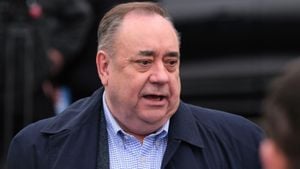Global responses to the Russo-Ukrainian War have unfolded dramatically over the past months, reflecting a complex web of geopolitical maneuvers and shifting alliances. On one side, the United States has been imposing sanctions targeting key sectors of the Russian economy, hoping to cripple the military machinery fueling the conflict. Notably, recent actions have focused on military shipbuilders and diamond mining companies linked to the Kremlin.
Since the onset of Russia's "special military operation" on February 24, U.S. officials have been monitoring the battlefield closely, noting Ukrainians' determined resistance against Russian forces. This struggle became even more evident when footage from Bucha emerged, showcasing the grim aftermath of Russian withdrawal – scenes of civilian casualties and destruction led to accusations of war crimes. Such images galvanized international outrage and spurred stronger responses from allies.
The U.S. Congress has not shied away from its obligations, voting overwhelmingly to suspend normal trade relations with Russia and Belarus, which paves the way for increased tariffs on various imported goods. Interestingly, only three representatives voted against this measure, showcasing the broad bipartisan support these actions have garnered. The Biden administration is working hand-in-hand with legislative actions to execute these sanctions, which also include barring Russian energy imports.
Meanwhile, NATO's Secretary-General Jens Stoltenberg has expressed concern over the shifting dynamics within the conflict. He indicated Russia's apparent regrouping rather than regression, warning of potential escalations, particularly as heavy offensive operations were projected for the Donbas region. This assessment underlines the precarious situation on the ground, leaving Ukrainians vulnerable as they brace for renewed Russian efforts.
Further compounding the complications, the United Nations General Assembly made the historic decision to suspend Russia from its Human Rights Council, responding to the visible atrocities reported on the battlefield. A significant majority supported the suspension, reflecting widespread condemnation of Russian actions. Among opposing voices were nations loyal to Moscow like Iran, North Korea, and Venezuela, each relaying their discontent over perceived Western encroachments on sovereign rights.
But what's notable is the growing partnership between North Korea and Russia amid this turbulent backdrop. North Korean leader Kim Jong Un has pledged unwavering support for Russia's actions, perceiving them as necessary defenses against NATO expansion and U.S. aggression. The alliance encompasses more than rhetoric; reports suggest North Korea has dispatched thousands of soldiers to assist Russian forces.
This military partnership raises eyebrows across the globe, where officials are not just concerned about militaristic alliances but also the potential for technology exchanges. North Korean assessments indicate collaboration might occur concerning advanced weaponry, which could significantly bolster Pyongyang's own arsenal.
During recent talks between Kim and Russian Defense Minister Andrei Belousov, it was revealed they had reached agreements on enhancing military cooperation, signalling the deepening ties between the two nations. This interaction highlights the current geopolitical strategy where nations like North Korea begin to see Russia as both ally and supporter amid the international upheaval.
While government leaders engage on the global stage, public sentiment remains highly polarized. The war has incited varying responses, with some seeing it as a wake-up call against traditional power dynamics, stimulating debates about future alignments and security strategies.
U.S. officials, facing pressure to navigate foreign policy with finesse, caution against possible escalations spiraling out from Ukrainian borders. With and NATO’s focus solidly placed on deterrence measures, the international community remains watchful. Preparations for long-term engagement now seem inevitable, with leaders preparing to address challenges posed not only by Russia but by its allies.
Yet, within the regional dynamics of the conflict, smaller nations are also weighing their own positions. Many countries express apprehension over the potential for Russia to utilize its influence to establish new footholds and alliances. With North Korea's military assistance potentially benefitting Russia on the frontline, these nations ponder where exactly the next lines of defense will lie.
Moving forward, global interconnectedness amid this war continues to play out on various fronts, from humanitarian aid destined for affected cities to the geopolitical chess game of diplomatic strategies. What remains clear is the resolve from many nations to hold Russia accountable for its actions, as they press forward with sanctions and negotiations, all the meanwhile keeping the dialogue open on future military and tactical partnerships.
Despite the challenges, past actions provide insight for forthcoming strategies, where sanctions and diplomatic discourse converge to forge pathways toward resolution. With NATO coordinating responses and reinforcing its presence, the collective global response signifies unity against aggression. This situation will undoubtedly evolve as international stakes grow, bridging alliances and shaping the future of military engagements.
The situation continues to sway dynamically, with every new development echoing across the globe and prompting international deliberations. The world watches closely as nations reassess their positions on the war and prepare for the potential changes to the global order.



